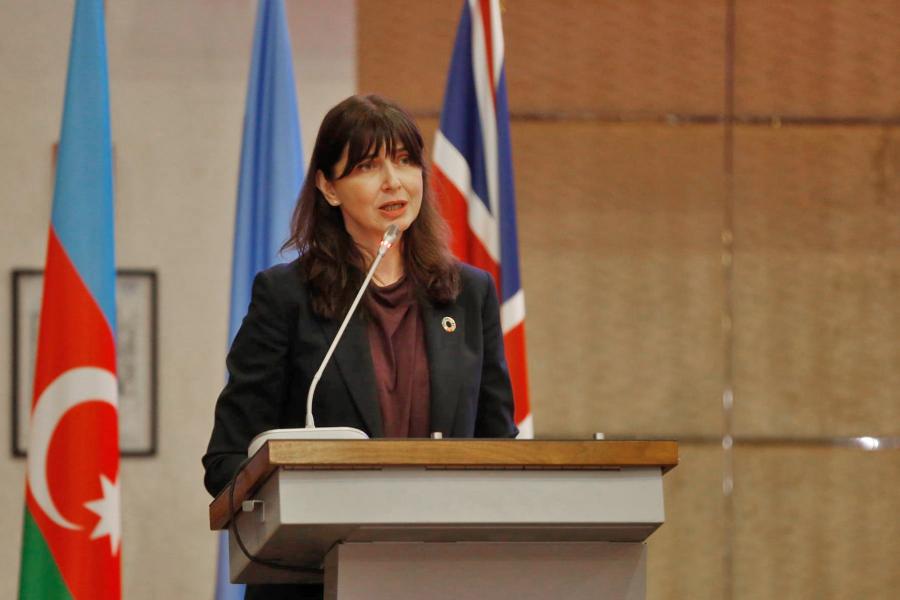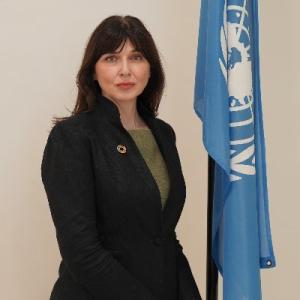Speech by UN Resident Coordinator Vladanka Andreeva at the UN Day event "COP26 – Ensuring brighter future for all"
Climate change has gone from being a fringe issue to a global priority.

Mr Rauf Hajiyev, Deputy Minister of Ecology and Natural Resources.
Mr James Sharp, Ambassador of the United Kingdom to the Republic of Azerbaijan.
Excellencies, Distinguished guests, Colleagues,
It is my pleasure to welcome you today to the commemoration of the 76th United Nations Day. To mark the UN Day this year, we wanted to bring the attention to one of the most urgent existential threats to our planet – climate change.
For nearly three decades the UN has been bringing together almost every country on earth for global climate summits - called COPs - ‘Conference of the Parties’.
In that time climate change has gone from being a fringe issue to a global priority.
This year will be the 26th annual summit –COP 26 – and it will start in just few days, on 31 October, hosted by the UK.
The world leaders will gather in Glasgow, for two weeks to discuss and agree on acceleration of actions towards the goals of the Paris Agreement and the UN Framework Convention on Climate Change.
Under the Paris Agreement, countries committed to bring forward national plans setting out how much they would reduce their emissions - known as Nationally Determined Contributions, or ‘NDCs’. They agreed that every five years they would come back with an updated plan that would reflect their highest possible ambition at that time.
But the commitments laid out in Paris did not come close to limiting global warming to 1.5 degrees, and the window for achieving this is closing.
The decade out to 2030 will be crucial. So as momentous as Paris was, countries must go much further to keep the hope of holding temperature rises to 1.5 degrees alive.
We also need a financial commitment to providing $100 billion dollars each year to the developing world for climate action.
Additional investments for mitigation and adaptation are also required.
As the UN Secretary General has pointed out on numerous occasions, we are far from achieving those targets.
The current Nationally Determined Contributions by the countries, are not sufficient and they will lead to a catastrophic 2.7C global temperature rise.
The world needs more ambitious pledges and decisive actions because we don’t have a Planet B.
Distinguished guests,
Here, in Azerbaijan we are encouraged by the Government’s actions to meet its international obligations and put in place appropriate policy and institutional frameworks in support of environmental action.
Azerbaijan has acceded to the Framework Convention on Climate Change and its Kyoto Protocol; it has also ratified the Sendai Framework and is aiming to increase the use of alternative and renewable energy sources.
As part of its international commitments under these instruments, Azerbaijan regularly reports on climate change related trends and developments in the form of national communications and biennial update reports.
With UN’s technical support, Azerbaijan prepared its Fourth National Communication report, as part of its international commitments under the UN Framework Convention on Climate Change.
While Azerbaijan is not a major contributor to greenhouse gas emission, it has committed to a 35% reduction target in the level of greenhouse gas emissions by 2030, as part of its commitment under the Paris Climate Agreement.
Yet despite these efforts, the effects of climate change are visible in Azerbaijan, with the water sector experiencing the most severe shortages to be witnessed in years. Around 43% of the country is affected by land erosion, and 20% by salinization.
Environment protection and climate action are key priorities of the UN Sustainable Development Cooperation Framework - that the UN Country Team signed with the Government of Azerbaijan on 1 March 2021.
Our long-term goal is to increase the share of renewable energy in installed electricity capacity to 30 % before 2030.
In the medium term, we will focus our efforts on ensuring that by 2025 all people will benefit from climate strategies and environment protection policies that ensure natural resources are sustainably managed, livelihoods are protected, and resilience is strengthened.
We work closely with our partners in the government, civil society, private sector, youth and others in delivering on these results.
Allow me to give just few examples of how the UN family is supporting actions to address climate change:
- As part of the EU4Climate project, UNDP in partnership with the Ministry of Ecology and Natural Resources has prepared updated Nationally Determined Contributions, which are expected to be submitted before COP26.
- UNDP also launched the AquaHack innovation challenge - a water-themed hackathon that attracted over 300 applicants to work on finding innovative and affordable ways of tackling water-related issues.
- Azerbaijan has finalised the legal review of draft legislation on Environmental Impact Assessment with support from the UN Economic Commission for Europe;
- FAO is supporting national partners to improve pesticide management .
- To ensure the sustainable use of forest ecosystems, a National Forest Assessment and Monitoring System was strengthened with FAO technical and advisory support.
The COVID 19 epidemic has shown us how crucial it is to find agreement among nations if we are to solve such worldwide problems.
But the climate change problems that await us within the next 5 - 10 years are even greater.
Upcoming COP26 is an opportunity and a high time to move from commitments to real urgent action.
WE ALL HAVE A PART TO PLAY TO TACKLE CLIMATE CHANGE.
Thank you!
Speech by


